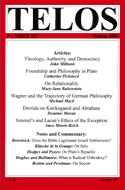On Tuesdays at the TELOSscope blog, we highlight a past Telos article whose critical insights continue to illuminate our thinking and challenge our assumptions. Today, Jennifer Wang looks at Mary-Jane Rubenstein’s “Relationality: The Gift After Ontotheology,” from Telos 123 (Spring 2002).
 The term ontotheology has come to mean the relegation of God to a being among beings, or, even further, the entrapment of God within Being. In “Relationality: The Gift After Ontotheology,” Mary-Jane Rubenstein asks whether we must discard Being as an improper name of God and adopt what she takes to be a unilateral concept of the gift in order to overcome ontotheology. Drawing on John Milbank, she proposes that we think of Being and the gift as conditioned on Trinitarian exchange, a conception that accentuates reciprocity rather than either self-abandonment, never-ending obligation, or perpetual uncertainty.
The term ontotheology has come to mean the relegation of God to a being among beings, or, even further, the entrapment of God within Being. In “Relationality: The Gift After Ontotheology,” Mary-Jane Rubenstein asks whether we must discard Being as an improper name of God and adopt what she takes to be a unilateral concept of the gift in order to overcome ontotheology. Drawing on John Milbank, she proposes that we think of Being and the gift as conditioned on Trinitarian exchange, a conception that accentuates reciprocity rather than either self-abandonment, never-ending obligation, or perpetual uncertainty.
Those suspicious of the gift’s very possibility tend to focus on two extremes. One, Marcel Mauss’s lasting insight, traps the parties in an ever-circulating economy of exchange based on necessary, pressured reciprocation. Derrida breaks this endless cycle by insisting on the “pure” gift, an “entirely selfless, anonymous, and unilateral gift”—the second extreme. However, one never knows if one has truly given a gift, and so it always remains uncertain.
Rubenstein invokes Milbank’s reformulation of the critique of ontotheology, in which he says that Being should not be limited to epistemological understanding, for of course then it would need to be overcome. Because Derrida’s critique of ontotheology focuses on its absolutized epistemology, which erases ontological difference between the human and divine, he consequently also focus on the distance that allows for differentiation. Unfortunately, the resulting impossibility to understand God is also ontotheological, Rubenstein says, because “the subject cannot praise, thank, or define itself in relation to either of these ‘Gods’.” Of Jean-Luc Marion’s God, though, Milbank says that man cannot reciprocally give to Him and cannot then truly be in relation with Him. Thus, a theology of the gift must privilege relationality over both epistemology and its co-implied denial of difference.
The ever-pressing demand, then, is to determine the relationship between man and God. God must neither be the Hegelian God of speculation, who is identical to mankind, nor the radically other, infinitely withdrawn God of Derrida. Instead, the relation must preserve both difference and unity; this alone provides the escape from ontotheology.
Rubenstein points to the Trinity, where relationality is “always-already in operation,” as not only exemplary of this exchange across ontological difference, but the precondition of it. Being is a gift from that God of exchange and being-in-the-world is the beginning of human reciprocity. The gift’s impossibility, due to both self-identical circularity and unmediated difference, is thus avoided. Our reception of Being, simply existing, is the most basic form of return. From there, the self must go on to actively give back the gift it has received, as Rubenstein explains:
Yet, it is not enough, at least in terms of the God-relation, merely to exist. To be sure, existence alone is a reciprocation, but a minimal one; moreover, it is a misguided reciprocation, inasmuch as existence cannot possible be alone. Seeing the world as loved by God means receiving the gift as love, returning it in non-identical mimesis of the primary gesture of love, and awaiting its transformed restoration. The self that sees the world as loved sees itself as a gift, and gives itself back to the giver who first—and continually—gives itself to be received; the self’s ability to love God is its ability to give itself back (or up), imperfectly and always late, to God.
Invoking Milbank, who said, “the ontological question is only seriously posed and answered in practice,” Rubenstein concludes by concretizing that question with a meditation on our ontic relations. Human reciprocity with God absolutely depends on giving to others. One must give, however, without effacing, oneself—taken by Milbank to be the limit of Derrida’s self-sacrificial ethics. Rubenstein invokes Godelier’s analysis of gift-giving as a poignant comparison. In his anthropological analysis of gift-giving, commercial objects are typically under the sorts of criticisms put forth by Mauss and Derrida. However, these are dependent on the fixity of a society’s sacred objects, which recall to a people their divine connection. While people are required to keep and preserve their sacred objects, they are additionally obligated to “share the effects of the object’s divine power.” Rubenstein powerfully suggests that we consider selfhood as “sacred” rather than “commercial,” and in this analogous way, give without giving one’s self away. Such is the character of the divine—a relation that is strengthened by its giving—and so if Being is defined in terms of non-exhaustive and non-oppositional relationality, it remains proper to call God by that name.
Read the full version of Mary-Jane Rubenstein’s “Relationality: The Gift After Ontotheology” at the TELOS Online website. If you are affiliated with an institution that is an online subscriber to Telos, you have free access to our complete online archive. If not, you can purchase 24-hour access to this and other Telos articles at the low rate of $5/article.








